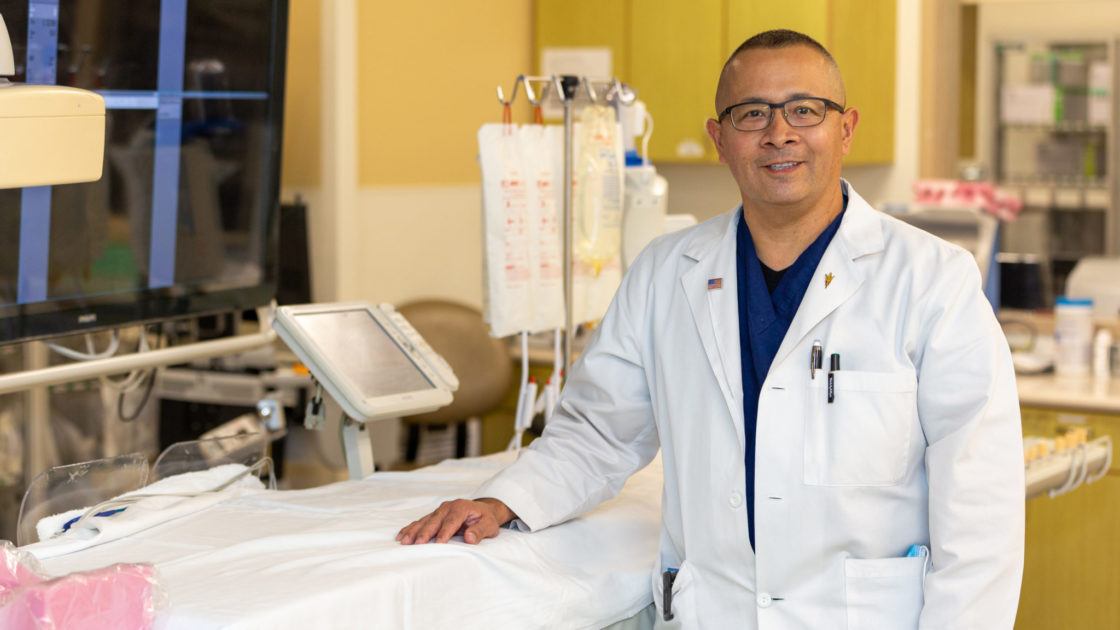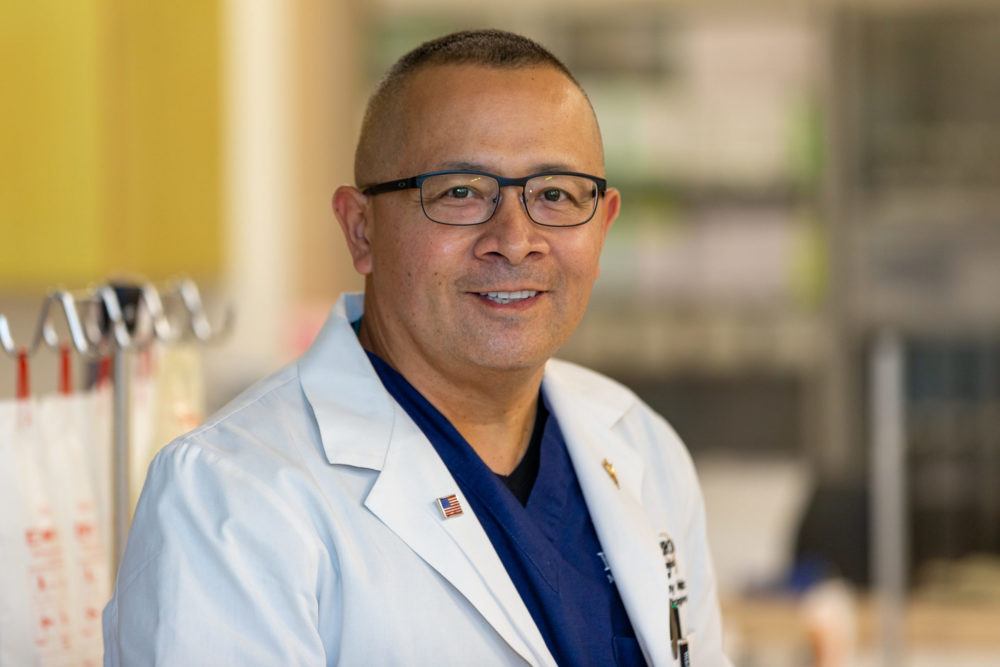
Meet Manny Mejia: Manager, Neurosurgery Nurse Practitioners
Endovascular neurosurgery is a fast-growing subspecialty, and acute-care nurse practitioner Manny Mejia takes great pride in being a student of the field.
“What I love about neuroendovascular is that it’s constantly evolving and that I’ve been part of it since its infancy,” he said. “The growth of the field has really taken off over the last 5 to 10 years.”
Endovascular neurosurgery involves using imaging to guide a catheter and tiny instruments through the network of blood vessels in the body to diagnose and treat vascular conditions of the brain and spinal cord. This technique can eliminate the need for open surgery or be performed prior to open surgery to reduce bleeding risk in complex cases.
What I love about neuroendovascular is that it’s constantly evolving and that I’ve been part of it since its infancy. The growth of the field has really taken off over the last 5 to 10 years.
Manny Mejia,
Acute-Care Nurse Practitioner, Endovascular Neurosurgery
As the nurse practitioner on the neuroendovascular team at Barrow Neurological Institute, Mejia gathers the medical history and performs physical examinations on patients before surgery and manages their care after surgery. He also assists endovascular neurosurgeons Felipe Albuquerque, MD, and Andrew Ducruet, MD, in performing cerebral angiography and endovascular neurosurgery procedures.
“He contributes in a substantial way to the quality of care we are able to provide patients undergoing both elective and urgent neurointerventional procedures,” Dr. Ducruet said.
He added that Mejia has played an essential role in helping to educate the new endovascular fellows each summer—most recently in radial access techniques. The radial artery is one of the major arteries in the forearm.
“Manny is an excellent clinician and an outstanding mentor to the fellows and residents in the endovascular suite,” said Virginia Prendergast, PhD, senior director of advanced practice nursing. “He consistently demonstrates meticulous attention to detail, and he approaches each interaction with the perfect mix of humility and humor.”
When Mejia isn’t helping with procedures or rounding on patients, he is handling the day-to-day responsibilities of managing a team of 10 neurosurgery nurse practitioners.
Finding His Health Care Niche
Mejia began his health care career in 1988 as a respiratory therapist at St. Joseph’s Hospital and Medical Center, where Barrow is located. He served as a supervisor for the Respiratory Therapy Department.
“As I went around to different areas of the hospital, I started wanting to do more with the patients,” he recalled. “As a respiratory therapist, I felt a little bit on the periphery.”
Mejia enrolled at Arizona State University and earned his Bachelor of Science in Nursing in 1999. He enthusiastically accepted a job in the Neurosurgical Intensive Care Unit at Barrow.
“I always favored neuro areas as a respiratory therapist,” he said. “I really fell in love with the brain and the spine and how the whole system worked.”

ACNP-C, FNP-C, MSN, CNRN
After a few years as a Neuro-ICU nurse, Mejia began working as a special procedures nurse. In this role, he became more involved in angiography and endovascular neurosurgery. So when he returned to school again—this time at the University of Phoenix—to earn his Master of Science in Nursing—Family Nurse Practitioner, the endovascular team at Barrow recruited him to join after graduation. He has been part of the team since 2007 and says he’s found his niche.
“I have known Manny since I came to Barrow as a fellow more than 20 years ago,” Dr. Albuquerque said. “I have seen a very talented nurse rise to the level of an indispensable asset to Barrow.”
Mejia earned his Post-Master’s Certificate—Acute Care Nurse Practitioner from Texas Tech University in 2011 in order to increase his procedural and critical care management skills and knowledge. He took on his management role in 2015.
“He manages a group of incredibly gifted nurse practitioners and brings the best out in them by recognizing potential and promoting excellence,” said Dr. Prendergast, who offered him the job.
A Constant Student; an Admired Teacher
Reflecting on the unexpected turns in his own career path, Mejia advises aspiring nurses to keep an open mind about the learning process.
“You really don’t know where you’re going to end up,” he said. “Having that educational background in your back pocket is huge when you find out what your calling is.”
He is grateful to work at Barrow in his home state of Arizona in part because the Institute values continuing education.
As a vital part of our neuroendovascular team, Manny extends our range and enables us to provide exceptional care to often critically ill patients.
Felipe Albuquerque, MD
Endovascular Neurosurgeon
But even though his health care career has evolved, the reward remains the same: caring for patients and supporting their families.
“You’re the lifeline for them in that transition from their life before to their hospitalization, so any bit of information or a kind word can go a long way,” he said.
While Mejia sees himself as a constant student of endovascular neurosurgery, his colleagues say they have learned a lot from him, too.
“Manny has been a friend, a trusted colleague, a mentor to many, and a teacher,” Dr. Albuquerque said. “It is in this last capacity that I have come to fully appreciate and respect how important Manny has become not only to the neuroendovascular service but to our institution as a whole. We have all learned from him, whether it be at the bedside, the angiography suite, or in meetings. As a vital part of our neuroendovascular team, Manny extends our range and enables us to provide exceptional care to often critically ill patients.”
